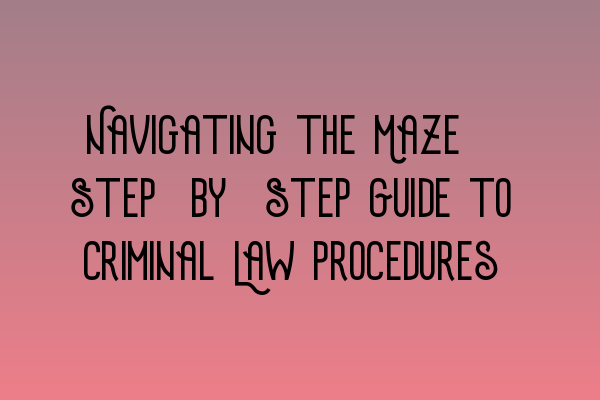Navigating the Maze: Step-by-Step Guide to Criminal Law Procedures
Welcome to SQE Criminal Law & Practice UK, your trusted source for comprehensive information on criminal law procedures. Navigating the maze of legal processes can be overwhelming, especially for those new to the field. That’s why we have created this step-by-step guide to help you understand the ins and outs of criminal law procedures. Whether you are a solicitor, writer, or SEO expert looking to expand your knowledge, we’ve got you covered. So, let’s dive in!
Understanding the Criminal Justice System
Before delving into the specifics of criminal law procedures, it is essential to grasp the fundamentals of the criminal justice system. Our related article on SQE 1 Preparation Courses provides an in-depth exploration of this topic, giving you a strong foundation to build upon.
The criminal justice system consists of a series of legal steps that are followed when a person is accused of committing a crime. These steps help ensure fair treatment and protect the rights of the accused. It is crucial to understand that the burden of proof lies with the prosecution, who must prove the guilt of the accused beyond a reasonable doubt.
The Criminal Law Procedures: A Step-by-Step Guide
1. Investigation: The initial phase of any criminal case involves the gathering of evidence and information by both the prosecution and the defense. This can include witness statements, forensic evidence, and other relevant documentation. To prepare for this stage, it is vital to understand the rules of evidence and how to effectively analyze and present it in court.
2. Arrest: If the police have sufficient evidence to believe that a crime has been committed and have identified a suspect, they may arrest the individual. It is crucial to know the rights of the arrested person, including their right to legal representation and the cautionary statement that must be provided.
3. Bail: After an arrest, a decision may be made regarding whether the suspect should be released on bail or held in custody. Understanding the factors that influence this decision and the bail application process is essential for any criminal law practitioner.
4. Charging: Once the investigation is complete, the prosecution will decide whether to charge the accused with a criminal offense. This decision is based on the evidence gathered during the investigation. Knowing the requirements for charging an individual and the criteria used to determine which offense to charge them with is crucial.
5. First Court Appearance: At the initial court appearance, commonly known as the first hearing, the charges are formally read out, and the accused is given an opportunity to enter a plea. Familiarize yourself with the procedures followed during this stage to effectively represent your client.
6. Preliminary Hearing: In some cases, a preliminary hearing may be held to determine whether there is sufficient evidence to proceed to trial. Knowing how to handle this stage, including legal arguments, motions, and applications, is essential for building a strong defense.
7. Pre-Trial Procedures: The pre-trial phase involves various procedures such as disclosure, preparation of witness statements, and other administrative tasks. Understanding these processes and deadlines can significantly impact the outcome of a case.
8. The Trial: The trial is the central stage of criminal law procedures, where the prosecution presents its evidence, and the defense has an opportunity to challenge it. Understanding courtroom etiquette, examination and cross-examination techniques, and the rules of evidence are essential for effective advocacy.
9. Sentencing: If the accused is found guilty, the court will determine an appropriate sentence. Knowledge of sentencing guidelines, case law, and mitigating factors will help you advocate for a fair and just outcome.
Continuing Your Legal Journey
As an aspiring solicitor, it is crucial to keep enhancing your knowledge and skills. Our related articles on SQE 1 Practice Exam Questions and SQE 1 Practice Mocks FLK1 FLK2 provide valuable resources for exam preparation. For those planning to specialize in criminal law, our SQE 2 Preparation Courses offer comprehensive guidance and support.
Stay up to date with important dates and deadlines by referring to our comprehensive list of SRA SQE Exam Dates. With diligent preparation and a solid understanding of criminal law procedures, you will be well-equipped to navigate the challenges of the legal profession.
Remember, at SQE Criminal Law & Practice UK, we are here to support you every step of the way. Explore our website for more insightful articles and resources to enhance your legal journey.
